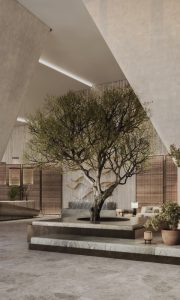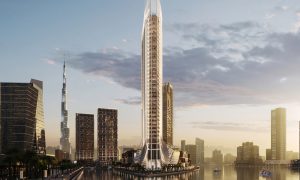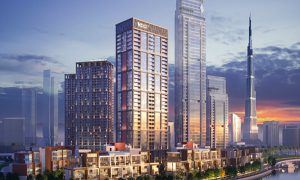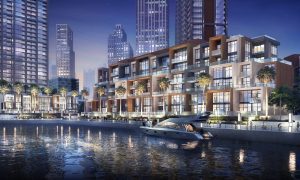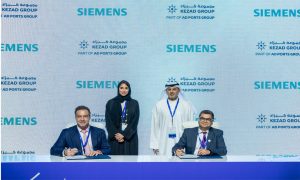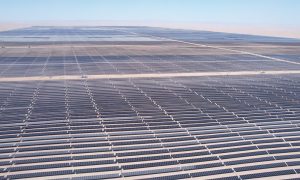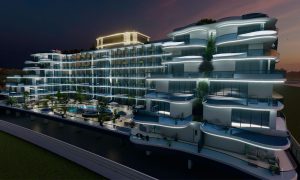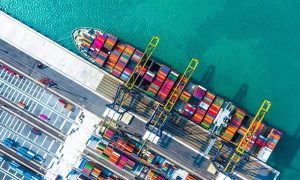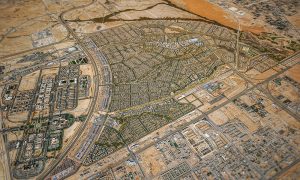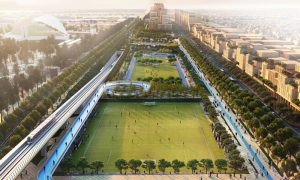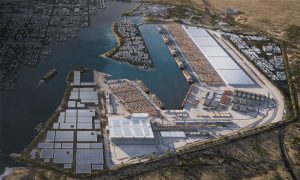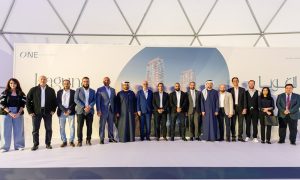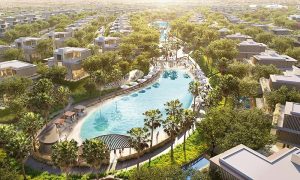Rahail Aslam, group CEO, Select Group – Interview
“We’re quite happy with the market. It’s just that we have to work harder. As a business, it makes us fitter.”

Last year, the UAE residential real estate market continued to decline, with Dubai in particular seeing property prices decrease by 7.4% on an annual basis. According to most experts, the market continued to face challenges due to the subdued employment growth in the country, particularly in the white-collar demographic, a key target sector for developers.
However, while most developers were reporting sluggish sales and slow uptake, one in particular bucked the prevailing market trend and announced a strong response for its high-end flagship mixed-use development in Dubai Marina.
In April, Select Group, a privately-owned Dubai property developer, announced that it had begun the handover of The Residences at Marina Gate 1, with the remaining two towers in the development scheduled to be completed in 2019 and 2020. Full handover of Marina Gate 1 is now completed, the developer says, adding that the building has 75% occupancy, with the remaining apartments handed over but not occupied.
As the company continues to develop a project pipeline worth $2.45bn for Dubai, with developments such as Studio One, Marina Gate II and Jumeirah Living Marina Gate on the way, Big Project ME sat down with Rahail Aslam, group CEO of Select Group, to discuss the company’s performance in 2018, and how it surmounted the challenges of a sluggish market.
“It’s been a good year [for us] in tough trading conditions. There’s obviously a lot of data out there, and we’re in the 12th quarter of decline. What we’ve found is that we’ve had to put in three or four more times the effort to get sales, as compared to previous years.
“In addition to that, there are a lot more incentives being offered by various developers. It’s almost a case of who can offer the most incentives to grab the attention of a few buyers. It’s certainly a buyer’s market today. You need to have the buyer’s confidence, you need to show them your product. They’re much more sophisticated now. For them to open up their wallet, you really need to keep up with the competition, which is pretty fierce!
“There is fierce competition on supply, with a very shallow buyer base, so it’s tough trading conditions. But having said that, we haven’t touched prices on Marina Gate, which is our flagship development. It’s a four-million-square-foot development and we’ve still been selling in healthy numbers – we haven’t touched rates. The product is really appreciated, and when you can touch it and feel it, it makes a lot of difference in terms of sales. When you take a customer there, they can see the facilities and the quality and detail, it all really stands out – and of course, the location makes a big difference,” Aslam says during an interview at Select Group’s offices in Dubai Marina.
“So, yes, we’ve had to work a lot harder to create the interest – through social media, outdoor advertising, all the various ways of creating leads. The conversion time is longer. It’s probably two or three times longer than it used to be. It can take up to six weeks to convert a customer, but at the end of the day, we’re selling real estate, so that’s quite a healthy environment. The days of someone coming in one day and signing an SKO are over. The market has moved on a long way.
“But we’re quite happy with the market. It’s just that we have to work harder. As a business, it makes us fitter. Eventually, the market will improve – and because we’ve been working so hard today, it should provide healthier dividends going forwards, because you’re just in better shape and you know how to react in a difficult market.”
Aslam points out that in tough market conditions, one of the most important things a real estate developer can do is continue to focus on the essentials. By continuing to deliver on its promise of developing and creating high-quality products in key locations, he says Select Group has been able to maintain its reputation and focus in the Dubai real estate market.
“We’ve not going to secondary locations – we continue to do waterfront development, for example. The opportunities [in the market] have not been to change our business processes or types of products, but it’s been to acquire super-prime land in a tough market. In a buoyant market, it would be tough to get a good-sized plot of land, as everybody wants to buy it. So currently, as a developer, it’s also a buyer’s market for those looking to build land banks.
“We’ve secured something in Business Bay – it’s a full water frontage site, 3.3m square feet of GFA. It’s a township with 4,500 units, a full mixed-use scheme. Retail, commercial, hotel and residential, and it’s in the planning stage. That’s been the opportunity for the business – what we’re developing there will be what the market wants, which is a quality product, smaller units, which we do anyway – and a primary location.”
Taking advantage of market conditions is part of Select Group’s strategy, Aslam reveals, explaining that the company decided a number of years ago to diversify its investment and explore alternative business verticals. Chief among these was investment in hospitality ventures, with hotels in key locations a major focus for the group.
As such, Select currently has investments in or owns a variety of properties across the UK. These include hospitality ventures like the Echo Building in Liverpool, a Radisson Blu Hotel in Birmingham and an Ibis Budget Hotel in Sheffield. In addition, the developer recently acquired an under-construction hotel in Frankfurt, Germany, and owns an InterContinental Hotel in Dubai itself.
Furthermore, the developer also has investments in a number of residential projects in both the UK and Dubai which are meant to generate double-digit returns for the group in the short to medium term, while also mitigating risk.
“Our business is very exposed to property development, where you have to have deep pockets. You keep on investing, eventually the project finishes, and then you get liquidity at the end of it. 80% of what we do is property development, so we decided – a number of years ago – to balance that out a little bit.
“We did this by buying hotels, which is passive in nature, produces income and also ensures that our geographic footprint and currency is diversified as well. Germany and UK were part of that strategy. We’ve now got relationships, through these acquisitions, with multiple operators like Accor, Novum and Meliá, which will operate a four-star hotel in Liverpool and will be part of a mixed-use scheme.
“Of course, we’re building the Jumeirah Living Marina Gate, we have the InterContinental up and running, and we have the Radisson Blu in Birmingham, UK. The growth [of the portfolio)] will continue. It’s a feature of the business now, and I expect hospitality to expand over the next five years. We’ve got six hotels in the group now, and the aim is to get to 10 hotels within the next five years.”
In order to achieve that target, Aslam points out that Select Group will be focusing on high-occupancy markets in regional cities. Rather than focusing on just prestige projects, he says the aim of investment will be on assets that can generate quick returns. To that end, he reveals that the developer has also expanded into retail investment, with the Marina Gate project having more than 150,000sqft of retail space.
“It’s become a business vertical. We’ve got Carrefour signed up for Marina Gate II, while King’s College is in Marina Gate I. That’s an international, high-quality hospital. That’s a real benefit to the residents and to nearby residents as well. There are also a multitude of tenants that are now doing fit-out. It’s a business vertical that’s passive in nature. You find your tenant, you sign a long-lease contract, and it becomes a passive income for the business.”
However, he is quick to rule out any investment in property development outside Dubai, stressing that the developer’s focus will not waver from the city. While this is down to the many opportunities still present in the local market, he also points out that passive investment in overseas projects is a key part of the company’s strategy.
“We’ve got an unwavering commitment to Dubai. Yes, it is difficult at the moment, but the city is one of the leading places in the world, in my opinion. It’s going through a consolidation phase, but we’ve got a long-term view about development here, so that will continue. That’s about financial planning as well, making sure that you’re well capitalised to develop what you’re doing.
“In terms of overseas, our intention is to continue acquiring hotels and not developing property. We’ve got a lot of development exposure here, and we don’t really want to add to that by having to manage developments overseas as well.
“There’s a learning curve to undertake when going to other markets. We’ve been in this market for more than 15 years. That learning curve is very steep, and we don’t want to take our focus away from where we’re well established. We’ve got a track record and a strong, loyal, customer base. It would be counterproductive to go into any other markets.”
This long-term view of the Dubai market is one of the reasons Aslam believes Select Group will continue to prosper in the city. While he does acknowledge concerns over saturation and oversupply, he is convinced that there is still an active market for high-quality projects.
“The concerns are there on the horizon for us, but we’re here for the long term. We’re capitalised to ride out any difficult times in the market. We’re still selling. There is a lot of product, and it is high-end, but it’s also compromised. Buyers are looking at A-Z nowadays, they look at who the developer is, what the service charges are, the finishes, the facilities, they read the SPAs, they hire third-party inspectors. Some of those perceived high-end developments, they don’t tick all these boxes. But I think that our planning, our developments, they speak for themselves,” he states confidently.
Looking ahead at 2019, Aslam remains calm about the real estate market in the region, despite the forecasts. He points out that Dubai has always been a market that operates in cycles, and that has also always responded very quickly to stimuli and changing sentiment.
“I think 2019 will be very similar to 2018. You’ve got geopolitical issues surrounding the region, you’ve got compromised oil prices – we’ve got to $75-80, but there’s been a contraction again because of concerns about oversupply. You’ve got a strong dollar with a lot of currencies paired to it, so it becomes more expensive to visit, buy and spend. Then you’ve got global sentiment, which is quite negative at the moment. There are a host of issues that just need to soften a little bit. Then, as soon as sentiment changes the market can change very quickly, particularly in Dubai, which reacts very fast.”
He also points out that the UAE government is aware of the challenges facing the market, and steps have been taken to restore balance.
“Look, the government has already recognised that elements of the competitiveness of the market have been lost, through a host of things. As such, they’re introducing many initiatives, but they will take time to unfold and make the market react. Markets are definitely cyclical – we’ve been in a negative cycle for a number of years. The data tells us that it’ll eventually bottom out and improve, but that could be in 2019 or it could be in 2020.”
However, he argues that contractors and developers also need to be more proactive and aware of the challenges facing the market.
“How non-payment is affecting the supply chain is a function of the market. There could be a host of reasons for that. There’s always non-performance by contractors, and the first thing an employer will do is not pay. Then you get into this tangled web of contractual letters, disputes and non-payments. While that’s going on, because it’s a long winded, protracted process, businesses will fail.
“How do you fix that? Well, when you set up a contract and when a contractor wants to pick an employer, just make sure that you know them, make sure that they have a balance sheet, and also try and make sure that their drawings and contracts provide for a sensible framework to govern a three, four- or five-year relationship.”
Aslam adds that he believes the current market situation will see more projects move towards design and build contracts, with contractors more likely to push for greater control over processes and procedures on-site. Having seen first-hand how well the process can work – Marina Gate was developed as a design and build contract with ALEC – he is a firm advocate.
“From our perspective – and we can’t speak for other developers – but on any new projects going forward, we’re going to use the exact same model as Marina Gate. We’re going to be involved in the schematic design with the contractor and the consultant, and then it becomes a design and build contract. You can iron out all the issues and then you give control to the contractor, so that he can control his timeframe and processes.
“Otherwise, with the conventional method, that’s where all the letters go back and forth – this detail isn’t there, that detail is missing and so on. From Select Group’s point of view, we’ve tried it with Marina Gate and it’s been a huge success. We’ve closed out the contract on Marina Gate I and there’s been no disputes, all the pluses and minuses have been clarified, and it’s been a great outcome! For sure, we’ll be using that design and built methodology on future projects,” he concludes.
